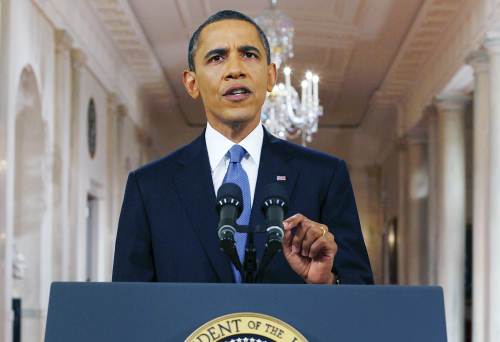President Obama says withdrawal marks beginning of ‘efforts to wind down the war’WASHINGTON (AP) ― Beginning to wind down a long and devastating war, President Barack Obama announced Wednesday night he was pulling home 33,000 troops from Afghanistan by next summer, withdrawing the “surge” of forces he had sent to rescue a flailing effort.
“The tide of war is receding,” Said Obama to a country eager for an exit.
A total of 10,000 troops will leave the war zone by the end of this year ― fulfilling Obama’s promise ― and more than 20,000 additional forces will leave by the summer of 2012, shortly before the president will go before voters in search of a second term.
Still, almost 70,000 U.S. troops will remain in an unstable country, fighting in a war bound to see more Americans killed.
Obama said they will leave at a steady pace, but the U.S. combat mission is not expected to end until December 2014 ― and even then, a sizable and enduring contingent may remain in a different role.
Obama’s announcement from the White House came in a perilous political environment, with Americans soured on the war and the economy, many members of Congress pushing him to get troops home even faster, and his Republican presidential rivals taking shots at his leadership at every chance.
Conceding the economic strain of waging war at a time of rising debt and fiscal constraint, Obama said it was time for America “to focus on nation building here at home.”
The withdrawal is supported by the bold bottom-line claims of his security team: Afghanistan, training ground for the Sept. 11, 2001, attacks on America, is no longer a launching pad for exporting terrorism and hasn’t been for years.
Yet the White House insists the U.S. must maintain a strong fighting force in Afghanistan for now to keep the country from slipping back into a haven for al-Qaida terrorists.
Obama said the materials recovered during the raid to get Osama bin Laden in Pakistan showed that the al-Qaida terror network was under deep strain.

U.S. President Barack Obama delivers a televised address from the White House in Washington on Wednesday on his plan to draw down U.S. troops in Afghanistan. (AFP-Yonhap News)
He said bin Laden himself expressed concern that his network would be unable to effectively replace senior leaders that had been killed.
The president declared, “We have put al-Qaida on a path to defeat, and we will not relent until the job is done.”
Some fellow Democrats suggested Obama wasn’t going fast enough.
“We will continue to press for a better outcome,” said House Democratic Leader Nancy Pelosi of California.
The president spoke for about 13 minutes from a silent East Room.
It was a strategic moment for him to try to explain a turning point in the war effort without elevating it to a major Oval Office address ― more of a stay-the-course case of progress and resilience.
“Of course, huge challenges remain,” the president said.
“This is the beginning ― but not the end ― of our effort to wind down this war. We will have to do the hard work of keeping the gains that we have made while we draw down our forces and transition responsibility for security to the Afghan government.”
Significant questions still loom, including whether Afghanistan’s government and security forces will be up to enormous job within a few years.
Yet Obama made clear the United States was ready to move on from a decade defined by wars in Afghanistan and Iraq, at a cost at of thousands of lives lost and more than $1 trillion spent.







